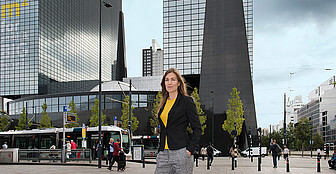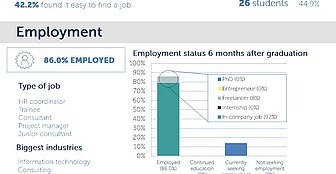
This website uses functional cookies, including analytical cookies. The obtained statistical data cannot be traced back to individual users. Additionally, you can choose to accept or refuse consent to use marketing cookies. If you decline these additional cookies or refrain from making a choice, only functional cookies will be set. See our cookie policy for more information.
Article: Friday, 15 May 2015
Follow the leader whilst showing a good example to your subordinates – such is the lot of the middle manager. This juggling of obligation and responsibility is made even more complicated when some of the decision-making at the top is deemed unfair. How do middle managers respond in such instances? Do they reproduce the unfair practices of their superiors or react against them? New research shows that creating physical distance from senior management reduces the chances of such unfair behaviour spreading.

This video cannot be loaded, as you have not accepted cookies.
Click here
to watch this video directly at the source.
Managerial unfairness is not only morally undesirable, it has also been shown to have a negative effect on the bottom line. This is especially the case if such a trend filters down to lower level managers who, in turn, emulate such behaviour. Middle managers are a particularly interesting case in point as senior management may potentially influence them and, in turn, have an impact upon the professional practices of their subordinates. Creating distance between managerial levels may also play a part in the extent to which middle managers replicate their superiors’ behaviour and decision-making. However, the right balance needs to be struck between healthy distance (so that middle managers are less exposed to questionable practices at the top) and remoteness (so that superiors are not too distant to be sensitive to their needs).
Our research indicates that self-image has a substantial impact on how middle managers respond to leader unfairness.
Until now it has been widely supposed that questionable decision-making and treatment of employees by senior management will be replicated by those lower down the ladder. This “assimilation effect” is based upon the assumption that middle managers view their superiors as role models. As part of their desire to serve, they end up aping some of the behaviour and practices they see above them. Whilst it is probably true that ethical leadership tends to breed ethical behaviour lower down, it is surely too simplistic to deduce that unethical leadership will trickle down to subordinates and subsequently bring out the worst in them.
The alternative scenario sees middle managers reacting against what they perceive to be poor or unfair senior managerial practice. Whilst they may not openly contest the behaviour they see at the top, they may intentionally seek a fairer approach when dealing with people hierarchically beneath them. However, to understand this contrasting behaviour requires a deeper investigation of the factors that can trigger it. New research indicates that managerial self-image and physical distance are crucial in this respect.
People base their self-image to varying extents upon their relations with other people within an organisation – who you feel close to can affect how you understand yourself. Our research indicates that self-image has a substantial impact on how middle managers respond to leader unfairness. Known as “relational-interdependent self-construal”, this phenomenon can be embedded into the hierarchical context of working within a company with other people. For example, lower level managers may be more or less inclined to define themselves in terms of their relation to their higher-level managers. A middle manager who identifies strongly with their manager may for instance describe themselves as “part of my manager’s team”. A manager who does not so strongly identify with the manager will be less likely to have their relationship with the superior as part of the self-definition.
The level of relational-interdependent self-construal can impact the extent to which people emulate the behaviour of others, good or bad. High relational-interdependent self-construal (high identifiers) are likely to emulate other people’s behaviour. For this to happen, people must perceive a certain similarity with those others in order to then replicate their behaviour. By contrast, it is less likely that, for example, a middle manager within a company would aim to mirror the questionable actions of a hierarchical superior with whom they felt little connection and not much in common. It is for this reason that recent research activity has sought to make the connection between relational-interdependent self-construal and the likelihood of unfair managerial practice being replicated.
Physical distance is an antecedent to relational-interdependent self-construal. The reason for this is that, on the whole, people are less likely to find a similarity with someone located farther afield. Hence, in general, middle managers are less likely to be inclined to emulate the behaviour of superiors that are farther away – located in another building, city or country. Our research shows that this is mainly important when superiors act in undesirable ways.
Recent research activity has shown distance and relational-interdependent self-construal to affect the way in which people respond to high-level unfairness. A wide-ranging, multi-part study examining the reactions of undergraduate populations as well as currently active professionals has delved into this issue from a variety of angles. These include the importance of relations with a team leader to self-image, the creation of distance via a network set-up, the fairness of hierarchical superiors during annual pay negotiations, and reactions to the distribution of tasks by supervisors.
Results all point in the same direction: undesirable behaviour at the top is contrasted by middle managers relatively far away (they become more fair), but assimilated by those closer by (they become less fair). Middle managers, in their dual role as supervised and supervising members of a company, are especially impacted by this situation – they may experience unfairness from those above them and then have to decide whether to inflict this same behaviour on those beneath them.
…the implications of this phenomenon underscore the importance to strike the right balance between distance and remoteness.
On a practical level, the implications of this phenomenon underscore the importance to strike the right balance between distance and remoteness. A little distance allows middle managers to “be their own man or woman”, but too much and they may be “out of the loop”. In more general terms, our research shows how important it is to create a physical work environment that suits the needs of the organisation and its employees – significant enough distance to reduce the chances of bad practices filtering down but not so large a distance as to make senior management appear remote.
Company heads therefore need to think twice when considering increasingly virtual, physically distant professional set-ups or when planning to expand on a geographical level. In companies where leadership is very much “by example” (implying that senior management act as role models), creating physical distance will reduce the chances of such an approach being successful. On the other hand, distance also offers certain advantages as it reduces the chance of unfair behaviour spreading within an organisation. Finding a happy medium between the two scenarios is the challenge.
On a theoretical level, the interrelation of the physical and the psychological is worthy of deeper investigation beyond the notion of distance. For example, it has been suggested that a darker workplace can induce less ethical behaviour from employees. How this and other aspects of the working environment can influence professional behaviour remains to be seen. In addition, most research activity has so far concentrated on the response of individuals to their superiors, in the “follower” mode. However, who is to say that many people within the workplace are not just as, if not more, impacted by the behaviour of those beneath them?
These and other points deserve continued consideration and exploration. However, the crucial lessons to emerge so far are that distance need not be a bad thing in order to do business effectively. Above all, senior managers need to strike a balance between leading by example and creating the right conditions for their “followers” to also enjoy a degree of autonomy and a healthy distance from goings-on at the top, especially when some of those goings-on are viewed in a dim light.
TNO

This article draws inspiration from the paper Fairness Enactment as Response to Higher Level Unfairness: The Roles of Self-Construal and Spatial Distance, written by Gijs van Houwelingen, Marius van Dijke and David De Cremer and published in the Journal of Management (STAR), April 16, 2014. DOI: http://dx.doi.org/10.1177/0149206314530166

In contrast to the abundance of evidence on employee reactions to manager unfairness, we know very little about factors that predict whether managers will act fairly or not. This article explores the effect of procedural unfairness that emanates from higher level managers on procedural fairness enactment at lower levels in the organization. We argue that lower level managers can enact both more and less fair procedures in response to higher level unfairness and that this depends on the extent to which lower level managers define the self in terms of their relation with their higher level manager (i.e., relational-interdependent self-construal). We study both the moderating role of self-construal and how it is embedded in the physical environment of the organization. We pay particular attention to how spatial distance between higher and lower management affects self-construal at lower levels and—because of this relationship—the enactment of fair procedures within the organization. We conduct four studies (in two of which we study spatial distance as an antecedent for self-construal) and show that relatively high levels of relational-interdependent self-construal lead to assimilation in terms of procedural fairness enactment, whereas relatively low levels lead to contrast.



















Science Communication and Media Officer

Corporate Communications & PR Manager
Rotterdam School of Management, Erasmus University (RSM) is one of Europe’s top-ranked business schools. RSM provides ground-breaking research and education furthering excellence in all aspects of management and is based in the international port city of Rotterdam – a vital nexus of business, logistics and trade. RSM’s primary focus is on developing business leaders with international careers who can become a force for positive change by carrying their innovative mindset into a sustainable future. Our first-class range of bachelor, master, MBA, PhD and executive programmes encourage them to become to become critical, creative, caring and collaborative thinkers and doers.
